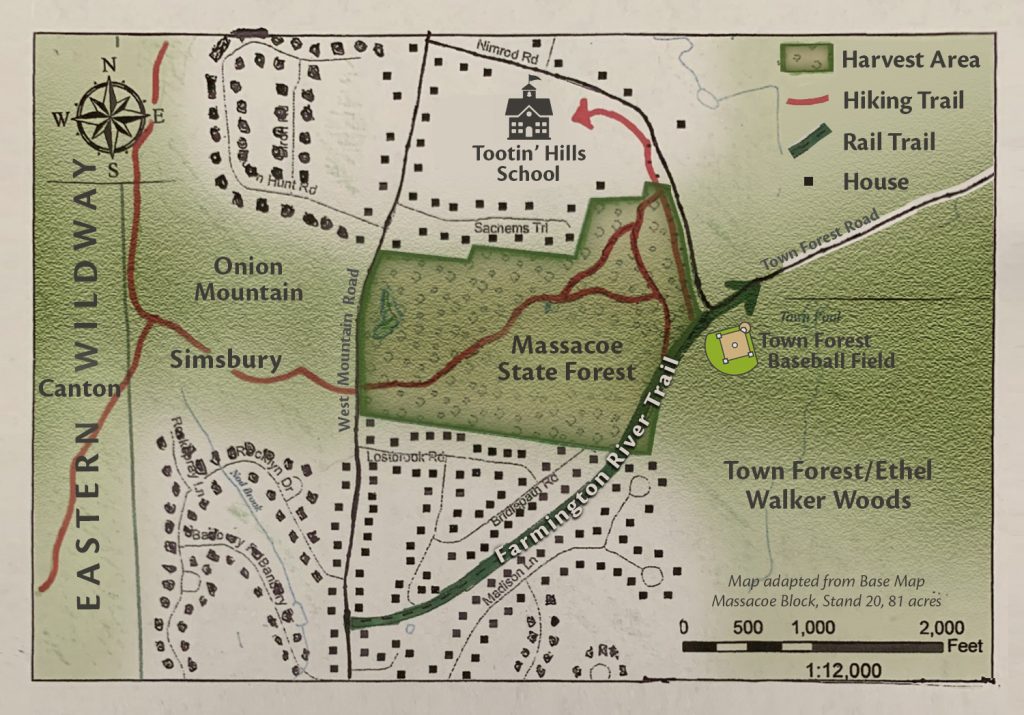There are no plans to continue the timber harvest in the Southern block of Massacoe State Forest. This timber sale (~80 acres for $20,000) is the main focus of this site. We thank everyone who acted quickly enough to spare most of the school trail, forest carbon, wildlife corridor, and species of special concern.
Recently, DEEP sold another timber harvest in the Great Pond block of Massacoe State Forest ($2000) to address some of the problems caused by the last timber sale.
A little public forest in Simsbury, CT – open to all, and loved by people from several towns
A healthy natural corridor on the Eastern Wildway, containing species of special concern
A beautiful quiet trail and a walking path to Tootin’ Hills Elementary School

Problem:
- CT DEEP plans to log the entire forest, even though it is a critical corridor. It is healthy and has no problems.
- Carbon will be lost for many decades, and many species will be impacted.
- Disturbance invites invasive plant species – impacting forest health, harboring ticks and requiring chemical treatment.
- This plan will destroy the main trails, and impact the walking trail to Tootin’ Hills Elementary School
Solution:
Sign the Petition.
Extend the current pause in harvesting.
Support funding for DEEP as they prioritize carbon accumulation and climate mitigation, nature, and health for all species.
Rededicate the forest for education, long-term research (its original intent), and passive recreation and transportation.
Visit www.keepthewoods.org and sign the “Petition to Protect.”
Find out more, and see many additional photos and videos.
Massacoe BEFORE Management

Massacoe AFTER Management

Massacoe (stand 20) is a small natural forest for the public and should not be used as a timber product resource.
Background: In 2014 the Connecticut Department of Energy and Environmental Protection (DEEP) approved a plan for forest management in Massacoe State Forest, Simsbury, CT. The plan includes the Great Pond block and the Southern block (150 West Mountain Rd., Simsbury. Management has been underway in the Great Pond block in recent years.
If you want to see what the Southern block could look like, please visit the Great Pond block. Many find it impossible to enjoy this area now.
Or, stop and visit 150 West Mountain Rd. The area of concern is shown on the map. Its timber was sold ($21,040 for 81 out of 83 acres). Six acres were harvested in June 2020. An unknown number of large logs from old trees, some ~30” in diameter, were removed immediately.
1355 logs were left on site.
235 logs were eligible for the sawmill (typically oaks ~60 years old, ~12” diameter). Most of these have now been removed.
~1100 logs were intended to be burned (typically red maple, ~5-8” diameter). Some are still on site along with residue (tree tops, branches and thousands of crushed trees and shrubs).
If this plan had continued for the full 80 acres, well over 100 truckloads of logs would carry 124,092 board feet of oak sawtimber and 433 cords of mixed cordwood/biomass from the forest, leaving an apocalyptic environment that will breed invasive plants and dehome and disrupt many mammals, reptiles, amphibians, and birds – not to mention the damage, carbon loss and disruption to the soil and underground networks.
This forest is surrounded by hundreds of homes and connects to the Eastern Wildway. It has much more value than its wood. For people and all species who enjoy this forest, the most important local harvest of this forest is health. Intervention in this public forest should be based on evidence of a problem.
The ecology of the Southern block was not inventoried prior to a timber harvest which started during migratory bird nesting season. The forest has breeding populations of migratory songbirds, declining species and species of special concern like the ovenbird and Eastern Box Turtle. It also has wetlands and vernal pools, at least 39 bird species, dozens of plant species – and no invasive plants! Incredibly DEEP only lists 2 species of insects, even though vegetation growing there now supports hundreds of pollinator species and many many other insects.
In the uncut area, there is a robust understory without invasive plants and with trees of many species and sizes growing and regenerating. Several experts (in ecology, birds, plants) have rated it an “exceptional” suburban forest, based on the biodiversity, lack of invasive plants, and healthy regeneration.
How to Help:
- Find out more, and sign the Petition to Preserve Massacoe State Forest at www.KeepTheWoods.org
- Contact CT State Senator Kevin Witkos at 860.240.8800 and THANK HIM for his support.
- Contact CT State Representative John Hampton at 860.240.8659 and THANK HIM for his support
- Contact any other State legislators and officials. Send Comments to deep.climatechange@ct.gov
- Send comments or questions to keepthewoods@gmail.com and sign up for email updates.
See and Learn About the Forest:
Meet Fridays at 9 AM at 150 Nimrod Rd. (baseball field parking) for a short update and a forest walk (until~10 AM).